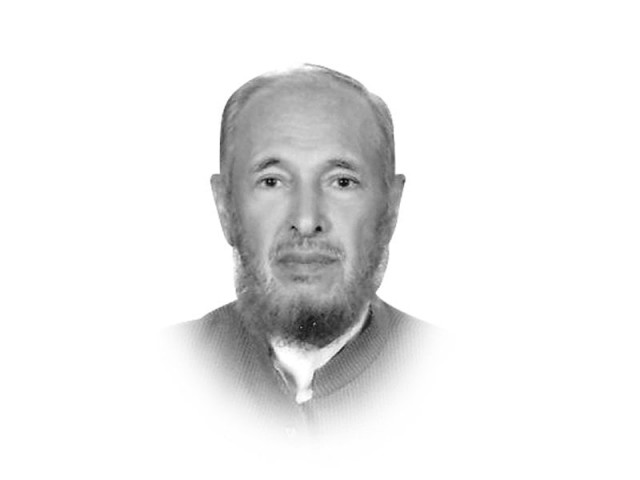Government needs reorientation of policy
Point-scoring is being resorted to at the expense of the more urgent, more important business of the state

The writer is a former chief secretary of K-P and a former ambassador
That appears to be happening in Pakistan as the government grapples with a wide range of issues that impinge on the lives of the people. There is nothing wrong with such an approach as long as it does not come with misplaced priorities.
But the issue in the Islamic Republic is somewhat more complicated. Not only is there a lopsided list of priorities, there is far more emphasis on an incessant, unending campaign of vilification of political opponents. An impression is being created as if exposing the real or perceived wrongs of the previous administrations is the overwhelming goal and objective that needs to be pursued with undivided attention.
What is not being realised is that such battle of point-scoring is being resorted to at the expense of the more urgent, more important business of the state.
Institutionalised accountability is at the core of any sound, viable democratic system anywhere in the world. That is a lofty concept and an enduring principle of good governance.
But going beyond that and introducing an element of vendetta by manipulating government departments for an onslaught against political rivals is grossly unfair. What is even worse is making such an approach as the centerpiece of the whole national policy.
Other than generating a climate of deep distrust and unnecessary backlash, such a proclivity towards others in the game of politics takes the focus away from vital issues — some of which have been referred to above. Not only that, this obsession with painting rivals in dark colours creates an environment in which the impact of some of the good work done by the regime is lost on the public.
But more importantly, the whole macro picture of a nation’s overall direction gets distorted as there is little time or energy to spend on the bigger issues.
Issues like human resource development have received scant attention. In a country of 220 million people, developing human resources should have been an uppermost priority in the minds of policymakers. Only by development of this most precious resource can the nation hope to successfully cope with the challenges of the socio-economic emancipation.
Providing quality education should have been at the top of the national agenda. In an increasingly competitive world, it is inconceivable that any country would find a place of honour and dignity without a solid educational base that is compatible and consistent with the needs and requirements of a modern, welfare state. Regrettably there is so much attention on quantity — all over. There are few mechanisms in place to ensure that quality education is imparted at all levels and that better monitoring systems are in place to ensure that investment in education delivers the desired results. One must ponder over the inability of our system to produce scientists, engineers who could design policies to transform our rural landscape and create conditions for raising incomes, generating more exports, making Pakistani products demanded more.
Agriculture — the backbone of our economy continues to be a very low-priority item on the national agenda. While millions depend on agriculture for survival and sustenance, there is an awful lack of attention at the highest level towards improving the quality of produce, expanding the number of high-yielding crops, diversifying the methods of irrigation, preventing waste, introducing new varieties of seeds, providing better marketing facilities, and finding more avenues for export etc.
On issues of foreign policy, there is the same trite, hackneyed approach towards addressing issues of critical importance to Pakistan.
A country that should have enormous expertise on the dynamics of the conflict in Afghanistan and a wide range of proposals for addressing the issue of insurgency seems to have little understanding of the complex interplay of the forces that drive the conflict.
The conflict in Afghanistan has affected no other country as badly as Pakistan. But there is no framework of proposals that could help break the logjam and usher in a process of meaningful dialogue to end the war. On the other hand, Pakistan keeps harping on the theme that ‘Taliban should agree to a ceasefire and come to the negotiating table’—as if it is so simple. Any insurgency anywhere in the world when militants stop fighting, would find it so difficult to motivate its cadres to pick up the arms and fight again. That lesson seems to have been lost on Pakistan’s policymakers.
There is no robust move to begin to engage India in a quest for durable peace. On the other hand, there is more emphasis on defiance, throwing challenges, vowing to teach lessons, etc. Where does this lead us?
Pursuing wholly unrealistic dreams of securing ‘Independence’ for Kashmir has not helped in the past 70 years and is unlikely to help in the future either. But the state of confrontation has caused incalculable damage to one-fifth of humanity for over seven decades. It appears this approach would continue in the foreseeable future with all its attendant awful consequences.
Faced with such heavy odds, there should have been a reappraisal of policy. Instead while there is lukewarm interest on the larger issues, there is a deep interest and commitment to confronting political opponents and wasting time and resources on less important issues.
The government can deliver only if there is an honest stock taking with a view to correcting the fundamental approach to addressing the wider issues linked to destiny, economic prosperity and peace and stability.
Published in The Express Tribune, June 1st, 2019.
Like Opinion & Editorial on Facebook, follow @ETOpEd on Twitter to receive all updates on all our daily pieces.















COMMENTS
Comments are moderated and generally will be posted if they are on-topic and not abusive.
For more information, please see our Comments FAQ